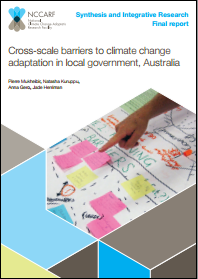Cross-scale barriers to climate change adaptation in local government, Australia

Introduction

However, the pathway to planning and implementation of adaptation is not a barrier free process. Local governments are embedded in a larger governance context that has the potential to limit the effectiveness of planned adaptation initiatives on the ground. Identifying barriers or constraints to adaptation is an important process in supporting successful adaptation planning, particularly where reworking the path dependent institutional structures, organisational cultures and policy-making procedures is required.
Methods
The report outlines the theoretical and conceptual framework underpinning the research, and explains the methodology and activities undertaken to gather data throughout the project. The study used a mixed-methods social research approach, drawing on interviews, case examples and stakeholder workshops, and including participants from within local government and also located in other government agencies and industry groups.
A literature review provides background to the regulatory context as well as the types of adaptation funds and programs that have supported local government in adaptation planning to date in Australia. The common barriers to adaptation within the local government context in Australia and internationally are synthesised.
Barriers
The research revealed that the cross-scale barriers faced by local government in relation to climate change adaptation are not unique to the field of climate change adaptation in Australia. It also showed that many of the barriers are faced by councils around Australia, and can be considered to fall into four main thematic areas (these are explored in detail in the report):
- poor understanding of the risks of limited access to and the uncertainty of climate change impact-related information;
- inconsistent governance structures, coordination, communications and leadership between the vertical tiers and horizontal levels of government;
- inconsistent problem definition and appropriate climate change adaptation frameworks to use for planning; and
- competing priorities in planning and implementing responses due to limited operational resourcing, in areas such as staffing and funding.
Enabling Factors
In addressing these challenges, the following key enabling actions were identified by the research participants (these are explored in detail in the report):
- Build community consensus on a shared understanding of the seriousness of climate change risks and the need to act.
- Allocate and agree upon priorities, roles and responsibilities at the three levels of government.
- Improve the national climate change adaptation framework.
- Utilise effective regional mechanisms and initiatives.
- Develop a consistent risk-planning and business case framework.
- Establish a central data-management and sharing mechanism.
- Make more effective use of existing and new government funds.
Authors
- Dr P Mukheibir (University of Technology Sydney)
- Dr N Kuruppu (University of Technology Sydney)
- A Gero (University of Technology Sydney)
- J Herriman (University of Technology Sydney)
Suggested Citation
Mukheibir, P., Kuruppu, N., Gero, A., Herriman, J., (2013) Cross-Scale Barriers to Climate Change Adaptation in Local Government, Australia. National Climate Change Adaptation Research Facility, Gold Coast, pp.101.
(0) Comments
There is no content